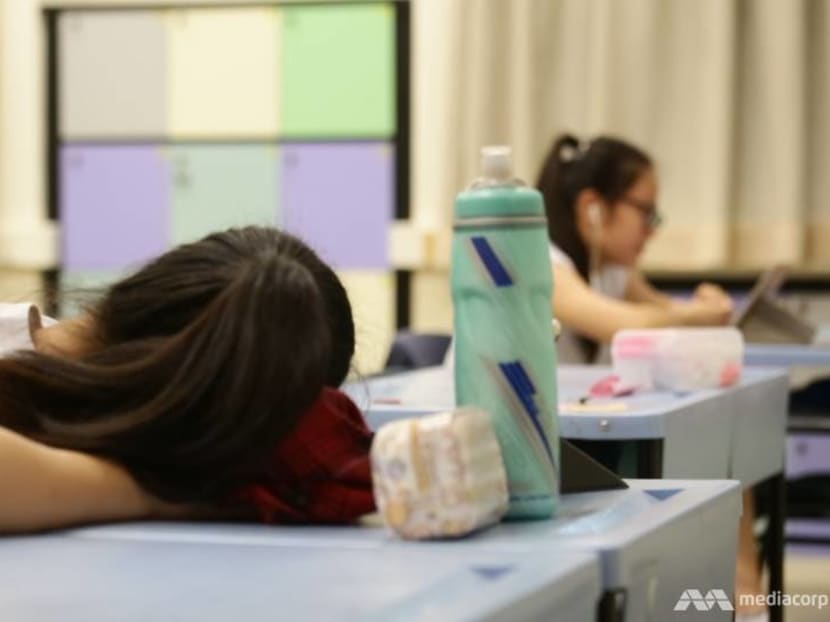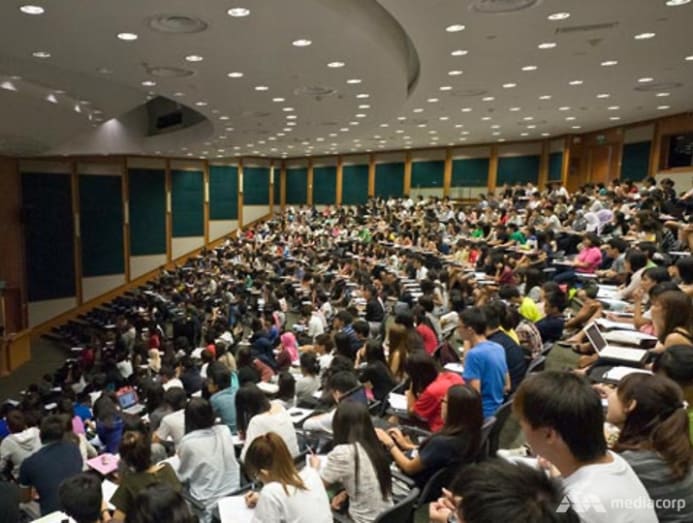commentary Commentary
Commentary: A necessity Singaporeans cannot afford – more sleep
More sleep or more work - this is a core dilemma every Singaporean must confront at some point in their lives, says Ng Chia Wee.

A student resting in class.
SINGAPORE: When people ask me about my first semester in university, I recount the experiences of living on campus and the wonders of immersing in a new academic world.
But what often stands out in my recount are all those late nights finishing up my work, an experience most of my peers should be extremely familiar with.
In the later weeks of the semester, I developed a habit of heading down to the convenience store slightly after 1am, so that I could take a break and indulge in a little night snack before I resumed my work.
The 2-minute walk brought me through the common study area as well as a Starbucks. It was an interesting feeling, seeing my peers hunched over their books and laptops and knowing that I was not alone. There was a quiet sense of solidarity that we’re all in this together, fighting for our futures.
On some of these walks I wondered why we didn’t just turn in. Forget about the work, forget about the test and just get some rest.

It was a thought I quickly quashed. In a similar vein, I thought, it would be naïve to think that these late nights would end when we have fought for our futures and attained our desired careers – better get used to it.
Naive indeed. A YouGov survey two weeks ago showed that 41 per cent of Singaporean adults get between 4 and 6 hours of sleep, even though they should be clocking in 7 to 8 hours.
“In a fast-paced metropolis like Singapore, only about half its citizens are getting enough rest,” said Mr Jake Gammon, the Asia-Pacific head of YouGov Omnibus.
The Singaporean, as well as his counterparts in the modern world, faces a paradox: Sleep is simultaneously a necessity we desperately require, and a luxury we cannot afford.
A NECESSITY WE DESPERATELY REQUIRE
We don’t need scientific research to alert us to the consequences of sleep deprivation. We know we just don’t function quite as well when we lack sleep. But even then, the actual statistics can be quite staggering, especially when many different pieces of research are combined.
In his 2017 New York Times bestseller Why We Sleep, neuroscience professor Michael Walker writes that “more than 20 large-scale epidemiological studies that have tracked millions of people over many decades” show that “the shorter your sleep, the shorter your life”. Walker continues, “the leading causes of disease and death in developed nations – heart disease, obesity, dementia, diabetes, and cancer – all have causal links to a lack of sleep.”
The cost to mental health is significant too: According to the Harvard Mental Health Letter, sleep problems may increase the risk for developing particular mental illnesses, such as depression and anxiety disorders, as well as result from them.

Seen in this light, the results of the second Singapore Mental Health study – published on the same day as the YouGov sleep survey – become far more sobering.
It’s clear that Singaporeans and their counterparts from other developed nations desperately need more sleep. But this is where it gets interesting – because we also see it as a luxury we cannot afford.
READ: Want to sleep better? Get a good pillow, a commentary
A LUXURY WE CANNOT AFFORD
Whenever a sleep survey gets published, the implicit takeaway is clear: We need to sleep more. And yet survey after survey, nothing has changed, despite us knowing that it’s something we desperately need.
Night after night, we chose to keep working, even though we very much want to turn in. We know full well that this is the choice we made and yet, it feels impossible to make any other choice.
The students, hunched over their notes and on their second cup of coffee, could very well have chosen to go to sleep early and turn in slipshod work or rush through revision, but that would mean a lower grade.
On a cumulative basis, this could affect employability. Alternatively, they could cut their co-curricular activities and focus only on academics, but how would that gel with the expectation of a holistically-educated candidate?
READ: My generation has a fear of missing out - on a disrupted future, a commentary
And what about those already employed? They could always change their job, be an average employee, forgo the promotion – but this just isn’t in the DNA of this “fast-paced metropolis” we call home.
As a nation, we pride ourselves on the hard work of our people, immersed in intense global competition and permanently connected to the technological grid. It is never that easy, just to work less and sleep more. Thus, we believe we can’t afford the luxury of sleep because the price to be paid is just too high.

A PRICE WORTH PAYING?
A necessity we desperately require and a luxury we cannot afford. Is there a way out of this paradox? Absolutely.
In fact, there are two ways out of it, but one must be prepared to pay a heavy price either way.
If you believe you must continue to prioritise work over sleep, then you must accept that you will pay the price in terms of your health and your mortality. And no, your body adapting to sleep deprivation doesn’t mean the health consequences aren’t coming.
If you want to change course and prioritise sleep over work, then you must pay the price of potentially falling behind and not being as financially well-off as your peers. You must settle for less and accept the cost of lower grades and slower promotions.
READ: Getting more sleep might land you that promotion, a commentary
If too many people take this route, the nation itself may pay a price in terms of what we fundamentally believe in – excellence, always.
Of course, this issue is more complex than any single commentary can present, especially when one considers the low-income and loss in productivity due to sleep deprivation.
Nevertheless, the core dilemma – more sleep or more work – is one which every Singaporean and citizen of the developed world must confront at some point in their lives, to stop and ask just what price they’re willing to pay.
And after all is said and done, we can only hope it was a price worth paying.
Ng Chia Wee is a first-year undergraduate at the National University of Singapore's Faculty of Arts and Social Sciences and Tembusu College.





